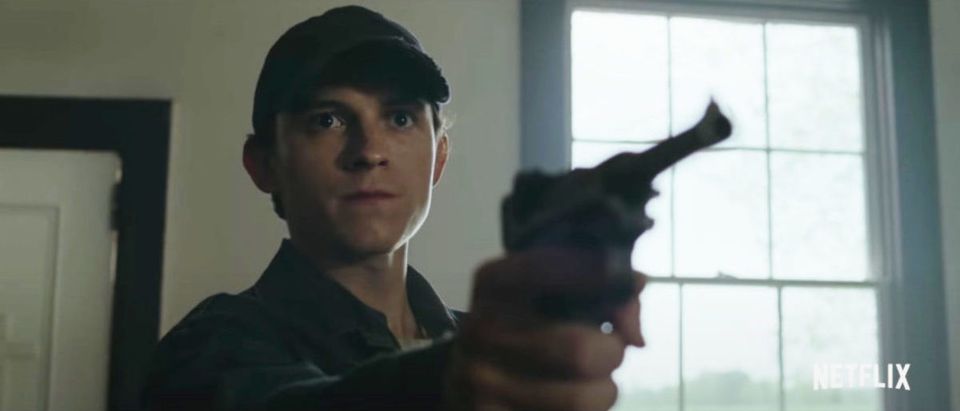The Devil All The Time (2020)

DIRECTOR: Antonio Campos
CAST: Tom Holland, Robert Pattinson, Sebastian Stan, Jason Clarke, Riley Keough, Bill Skarsgard, Eliza Scanlen, Haley Bennett, Mia Wasikowska, Harry Melling
REVIEW:
An adaptation of Donald Ray Pollock’s novel of the same name, The Devil All The Time suffers from a scattershot ensemble narrative—and overly slavish fidelity to Pollock’s sprawling written work—but compensates with a solid cast and a strong sense of atmosphere and slow burn tension to be a morbidly engrossing odyssey into darkness, even if it doesn’t quite add up to the sum of its parts.
While we follow an ensemble of characters and interconnected plot threads in and around 1950s Knockemstiff, Ohio (yes, that is a real place) and Coal Creek, West Virginia, it converges around Arvin Russell (Tom Holland), who has reason to be a troubled young man. His father Willard (Bill Skarsgard), a WWII veteran haunted by a heinous war crime he witnessed during the war, turns to religious fanaticism and animal sacrifices in a futile attempt to save his wife (Haley Bennett) from cancer, ultimately leaving Arvin to be raised by his grandmother (Kristin Griffith) alongside his stepsister Lenora (Eliza Scanlen), over whom he he is fiercely protective. Meanwhile, there are other plot strands, like the crooked Sheriff (Sebastian Stan), and a serial killer couple (Jason Clarke, Riley Keough), but when a new preacher (Robert Pattinson) who might not be what he presents himself as comes to town, it’ll eventually serve as a catalyst that will lead to Arvin taking matters into his own hands, and set his and other plotlines on a collision course.
First things first, The Devil All The Time is not for the faint of heart. While the movie skirts around some of the book’s most gruesome moments, there’s still a surfeit of disturbing characters and disturbing content creeping in from all directions. “There’s a lotta no good sons of bitches out there”, Willard warns his son, and boy are there ever. There’s not one, but two unsavory preachers, one a delusional fanatic played by Harry Melling (far removed from Harry Potter‘s Cousin Dudley) who demonstrates his scary levels of zealotry by dumping a jar of spiders over his face—and that’s not even the most disturbing thing he does—the other Robert Pattinson’s sleazy charlatan who preaches with the over-the-top fervor of a man who’s overcompensating and hiding something, namely a lustful eye for the impressionable teenage girls in his flock. Then there’s the traveling serial killer couple on the prowl for unlucky hitchhikers, and the female member of the pair’s apathetic and corrupt lawman brother. And that’s not even getting into Willard himself and his increasingly disturbing shrine in the woods, and the gruesome fate of the poor family dog. Religious symbolism, gospel music, and fiery sermons all hang heavy over the proceedings, but one gets the sneaking suspicion that Donald Ray Pollock is not the biggest fan of organized religion; both preachers onhand are portrayed negatively, each victimizing an impressionable young woman in their congregation, and Arvin, the least religious character in the movie, is also the most morally virtuous (comparatively speaking). At times, The Devil All The Time has the feel of something that could have been written by Stephen King—though devoid of any supernatural elements—and also piles on the heinous characters and series of unfortunate events so heavy that there’s moments where it verges on unintentionally blackly comical (you could make a drinking game out of every time someone does something messed-up). At the same time, it’s a morbidly compelling and engrossing journey into the heart of darkness that seems to dwell within almost everyone except Arvin—and a couple innocent bystanders—and he’s not an untarnished innocent, though he’s presented as an anti-hero and a victim of circumstances. When surrounded by so much depravity, the movie seems to argue, what choice does he ever have except to end up fighting back?

The biggest problem, from a narrative structure, is that Antonio Campos (and his brother Paulo Campos with whom he co-wrote the script) is overly slavish in fidelity to the minutiae of Pollock’s written word. The movie, while making some minor tweaks and switching up the chronology of certain events, is very much faithful to its origins, and Campos tries to include every detail of Pollock’s sprawling ensemble novel to the extent that there’s an awful lot going on even for a nearly two and a half hour movie, and various plotlines—especially those centering on Sheriff Bodecker and the serial killer couple—feel underdeveloped, while at the same time they dilute the central focus on Arvin that might have made his overriding arc more powerful. A couple bits of non-linear storytelling are a little unnecessarily confusing, although it’s not overused and mostly comes early on. I also have mixed feelings about the continual folksy narration (by author Donald Ray Pollock himself); while it sometimes adds interesting background insights (or an occasional darkly tongue-in-cheek aside), it also commits the sin of many voiceover narrations by talking too much and telling us things instead of just letting the scenes speak for themselves (personally, I would have kept it, but trimmed it down).
The movie weaves its immersive spell from the very beginning, with impeccable period details (lots of 1950s cars on display), a strong sense of time and place, and a uniformly credible acting ensemble giving this backwoods tale a feel of folksy authenticity (ironic, considering many of the cast members, including lead Tom Holland, are Brits and Aussies donning a hillbilly twang). While we eventually kick into gear with the confrontation halfway through that serves as catalyst to set everyone on a collision course, sense of narrative drive is uneven, with the movie first seeming to rush into a couple more showdowns, then end on a somewhat anti-climactic note. At times, The Devil All The Time has the feeling of a loosely-connected series of short stories strung together that don’t quite add up the way they should have, though some of those segments are tremendous (the riveting intensity and tension in the three pivotal confrontations in the second half may get viewers on the edge of their seats). One is left tantalized by what we get, but also feeling like this might have worked better as a miniseries, where everything going on is given more of a chance to breathe.

The cast consists of an interesting ensemble—including two Marvel stars and a future Batman—and despite some of the actors’ thinly-developed material, there’s not an off note to be found. Tom Holland, the closest thing we have to a lead (although he doesn’t show up for a while, with Arvin played as a child by Michael Banks Repeta), proves there’s more to him than Peter Parker/Spider-Man. Despite being a “good guy” in comparison to most of the other characters, Arvin is a troubled young man with violent tendencies and a dark side, and Holland demonstrates that he’s capable of an edge and intensity that “Spidey-Boy” never gives him the chance to show. Arvin commits multiple acts of violence (with varying degrees of provocation/justification), but partly because he’s played by the naturally affable Holland, partly because he’s presented as a victim of circumstances and his environment who’s been unwillingly thrust into becoming a fledgling vigilante, we root for him to make it out alive. Another Marvel cast member playing against type is an uncharacteristically pudgy Sebastian Stan (ironically in a role originally intended for yet another Marvel star, Chris Evans, who dropped out and recommended Stan as his replacement when he became unavailable due to scheduling conflicts), following up I, Tonya‘s Jeff Gilooly with another character actor-esque role intended to show he can play more than Bucky Barnes/The Winter Soldier. Sheriff Bodecker’s moral character might charitably be called questionable, but Stan plays him more as a flawed human being than a straightforward “villain”. Robert Pattinson turns his “heartthrob” image on its head as the lecherous Pastor Teagardin, oozing the oily charisma of a false preacher (though he’s gone to the Actor School of Weird Character Voices, sporting a nasally Southern drawl that at times strays into over-the-top). He doesn’t have a lot of screentime, but makes an impression. Jason Clarke is suitably creepy, with Riley Keough as his more conflicted partner-in-crime (and love). Even smallish roles make impressions, including Harry Melling’s frighteningly overzealous Reverend Roy, and Bill Skarsgard (shedding Pennywise’s clown makeup and getting to actually act) crafting a character who is both tragic and disturbing. If anyone gets short shrift, it’s the few women onhand (with the arguable exception of Keough). Eliza Scanlen (Beth March in last year’s Little Women) is probably the purest innocent onscreen, but serves as little more than a sacrificial catalyst, while Haley Bennett as Arvin’s sickly mother doesn’t get much screentime and Mia Wasikowska (as Lenora’s equally ill-fated mother) gets even less.
I had a little bit of a hard time summing up my final verdict on The Devil All The Time, but while it suffers from an unfocused narrative—and its unrelenting darkness may be a bit much for some viewers to take—it’s a compulsively morbidly engrossing and compelling journey that’s seldom boring, even if it doesn’t quite add up to as much as one feels it should have, bolstered by a solid cast and a palpable sense of unease and slow burn tension. It definitely won’t be everyone’s cup of tea, but for those to whom this kind of Southern Gothic material appeals, it’s sufficiently well-made and darkly absorbing to be worth a look.
* * 1/2